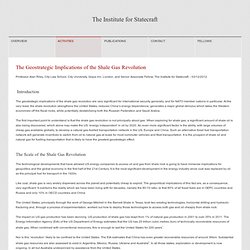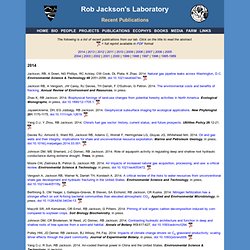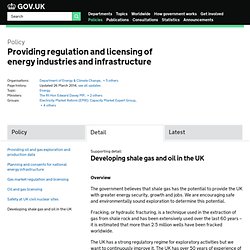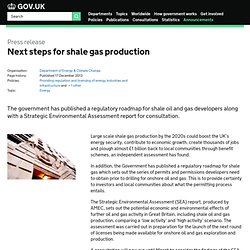

» Resources. We realise that fracking is a complex issue, and that there’s an ocean of information about fracking out there.

There is also much confusion and misinformation on both sides of the argument and it is advisable to check references and statistics for yourself. It’s also important to be aware that the industry has used strategies to smear or discredit some of the more influential films. A good example is the constant attack that Josh Fox, director of Gaslands, has been under. Meanwhile here’s a list of links to what we feel are credible films, videos and sources of background information around the issue of fracking, which provide an ideal introduction to the complexities of the fracking issue. We hope that this will help you to inform yourself so that you can decide for yourself whether or not fracking is something we should pursue in the UK. What is Fracking Taken from “What is Hydraulic Fracturing”, Frack Off. The Geostrategic Implications of the Shale Gas Revolution. Introduction The geostrategic implications of the shale gas revolution are very significant for international security generally, and for NATO member nations in particular.

At the very least, the shale revolution strengthens the United States; reduces China’s energy dependence; generates a major global stimulus which takes the Western economies off the fiscal rocks, while potentially destabilizing both the Russian Federation and Saudi Arabia. The first important point to understand is that the shale gas revolution is not principally about gas. When exploring for shale gas, a significant amount of shale oil is also being discovered, which alone may make the US ‘energy independent’ in oil by 2020. Fracking-Wastewater-IssueBrief. ReFINE - Researching Fracking IN Europe. Fracking — the pros and cons. The Author Scott A.

Elias, PhD Dr. Scott A. Elias is Professor of Quaternary Science in theDepartment of Geography of Royal Holloway, University of London, specializing in environmental biology. Recently, he became Editor-in-Chief of the upcoming Elsevier Reference Module in Earth Systems and Environmental Sciences, which will contain more than 3,800 peer-reviewed articles from Elsevier reference works, many on issues related to the state of the planet's health. Fracking: What is it? Fracking for shale gas has become big business, transforming the US energy landscape. Shale gas is methane trapped in tiny pockets in shale rock formations. The term "fracking" is short for "hydraulic fracturing. " What are the benefits? So much natural gas has been extracted through fracking in recent years that US carbon emissions are actually falling. Publications - Rob Jackson's Laboratory.
Jackson, RB, A Down, NG Phillips, RC Ackley, CW Cook, DL Plata, K Zhao. 2014.

Natural gas pipeline leaks across Washington, D.C. Environmental Science & Technology 48:2051-2058, doi:10.1021/es404474x. Jackson RB, A Vengosh, JW Carey, RJ Davies, TH Darrah, F O'Sullivan, G Pétron. 2014. Fracking history.
Impacts of fracking. Fracking theory. Shale_gas. Powered by EcoWatch. The Environment Nexus at iiea.com. The Environment Nexus: your digital ecosystem Nexus thinking is a new way of thinking which recognises the crucial interdependence of WATER, ENERGY and FOOD, and highlights the need for an integrated approach by policy-makers.

The IIEA/European Parliament Environment Nexus is an online hub for EU environment policy. Under three themes – water; agriculture and food security; and energy and climate – you will find visual, informative video interviews, animations, interactive infographics, country comparisons, voting polls, frequently asked questions, short articles and analytical policy reports that explain some of the most important environmental issues facing Ireland and the EU. This project, which runs from January to June 2013, brings together leading policy experts and top graphic designers to present environmental issues in an innovative way.
It is co-financed by the European Parliament and the IIEA. About the IIEA For more information on the IIEA's activities see www.iiea.com. Developing shale gas and oil in the UK - Providing regulation and licensing of energy industries and infrastructure - Policies. Overview The government believes that shale gas has the potential to provide the UK with greater energy security, growth and jobs.

We are encouraging safe and environmentally sound exploration to determine this potential. Fracking, or hydraulic fracturing, is a technique used in the extraction of gas from shale rock and has been extensively used over the last 60 years – it is estimated that more than 2.5 million wells have been fracked worldwide. The UK has a strong regulatory regime for exploratory activities but we want to continuously improve it.
The UK has over 50 years of experience of regulating the onshore oil and gas industry nationally. Facts about fracking More information is available in our “Facts about fracking” series of booklets covering: Next steps for shale gas production - Press releases. Large scale shale gas production by the 2020s could boost the UK’s energy security, contribute to economic growth, create thousands of jobs and plough almost £1 billion back to local communities through benefit schemes, an independent assessment has found.

In addition, the Government has published a regulatory roadmap for shale gas which sets out the series of permits and permissions developers need to obtain prior to drilling for onshore oil and gas. This is to provide certainty to investors and local communities about what the permitting process entails.